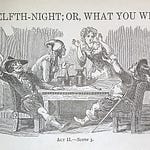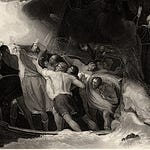Since there’s no help, come let us kiss and part. Nay, I have done, you get no more of me; And I am glad, yea glad with all my heart, That thus so cleanly I myself can free. Shake hands for ever, cancel all our vows, And when we meet at any time again, Be it not seen in either of our brows That we one jot of former love retain. Now at the last gasp of Love’s latest breath, When, his pulse failing, Passion speechless lies; When Faith is kneeling by his bed of death, And Innocence is closing up his eyes— Now, if thou wouldst, when all have given him over, From death to life thou might’st him yet recover!
For eight hundred years, we in the west have had a tradition of love songs and love poetry that flourished in every language and in all kinds of madcap ways — though now, I fear, it has finally come to an end. But imagine, the greatest minds and the most skillful artists turned their pens toward giving us pictures of human love, the passion that binds man and woman together. The best of them did not glaze it with sugar. They gave us its glory and its shame, its victories and its defeats, its breathless onset, its tumultuous growth, its maturing in marriage, or its collapse into disappointment and disillusionment. To come to an end of thinking about man and woman and love is almost to come to an end of being human. What is it like, to be about to say to your beloved, “I’m done, it’s over, we’re finished,” but still to love and to hope, still to deny with your heart what you say with your lips? That’s the dramatic situation that the poet Michael Drayton (1563-1631) gives us in this splendid sonnet. For the first eight lines the lover almost boasts that he’s had enough, he can leave the woman he used to love and he can be at peace, and then in the next four lines he portrays Love as on his deathbed, tended by the nurses of Faith and Innocence, and all seems well, all seems certain and inevitable. But then come the final two lines, addressed to the beloved — and at a single word, at a stroke, all might be changed again, and brought to life. Whether that would be a good thing, well, that’s another question!













